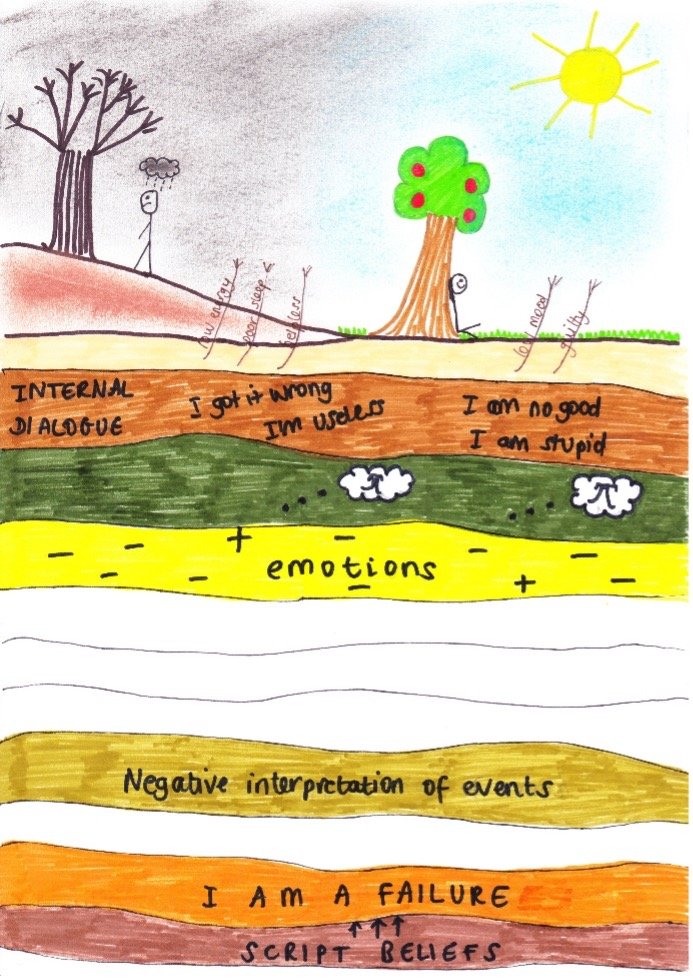Depression & Anxiety
Therapy for depression & anxiety - in pictures!
Depression and anxiety are ways of being in the world which often go hand-in-hand. If we suffer from depression and anxiety, our overall experience could be summed up as us feeling 'not OK'. With low energy and no enthusiasm, everyday tasks can feel like mountains to be climbed. Lack of hope, self criticism, and feelings of guilt or worthlessness can leave us feeling as though there's a dark cloud hanging over our head. Indeed, life can feel like a constant uphill struggle.
‘Not OK’
As we experience life in this way, we may look at others and feel increasingly disengaged, imagining them to be successful, happy, achieving... all the things we believe we're not. We can sum this up as feeling 'I'm not OK, you're OK'.
I’m not OK, you’re OK
Depression and anxiety have many symptoms and processes in common. The therapist is trained to see a bigger picture in terms of psychological processes and will identify the symptoms underlying your current perspective. Symptoms may include things like poor sleep, low energy, feeling helpless or stuck, low mood and over-thinking. These symptoms can be tenacious and, just like weeds in a garden, pop up without us even realising they're taking hold.
Symptoms of depression & anxiety
Typical processes underlying depression and anxiety can include self criticism and distorted thinking patterns. Catastrophising, fortune telling (predicting negative scenarios about the future) and black and white thinking ("I made a mistake, therefore I'm a failure") are common. These ways of thinking often result in a negative interpretation of events and an inability to appraise situations neutrally. Going further back into our history, negative script beliefs about ourselves, such as "I am inadequate" and negative beliefs about others (for example "I can't trust anyone") all feed into keeping us stuck.
In addition to working with cognitive processes, TA therapy works by addressing feelings and behaviours that keep us stuck. Reduced positive emotions and increased negative emotions are a double-edged sword and common features of depression and anxiety. Similarly, the way we relate to other people can perpetuate unhelpful patterns of behaviour, underscoring outdated beliefs we might have about ourselves and others.
Some of the processes which keep us feeling that we're 'not OK' are pictured below:
One of the primary goals of TA therapy is to experience life from an 'I'm OK, you're OK' life position. This is a perspective where we value ourselves and others, having good self esteem and experiencing happiness. We are engaged with life, feeling a sense of agency and robustness. We are better able to manage our feelings and less likely to succumb to unhelpful patterns of behaviour. Problems which arise are opportunities to learn from, rather than mountains to be climbed.
From the outset, the therapist will work to develop a relationship where you feel warmth and acceptance, by modelling an 'I'm OK, you're OK' experience. Working together in an equal partnership, the therapist walks alongside you, facilitating your journey.
'I'm OK, you're OK'
Just as we are all unique, so too the symptoms and processes underlying depression and anxiety differ from person to person. TA therapy can be really effective because the therapist is able to work flexibly with the needs of each individual. Working at your own pace, therapy can enable you to change the ways of being which keep you stuck, developing new, healthier ways of living. For example, developing a more nurturing internal dialogue and the ability to better regulate your feelings can be an important part of the therapeutic journey. General self-care changes, such as mindfulness, exercise and improved diet can also be crucial to supporting change.
People undertaking short-term TA therapy typically see improvements within 8-12 sessions, making changes which will support them to experience more of life from the 'I'm OK, you're OK' life position. Some of these changes are depicted below.






